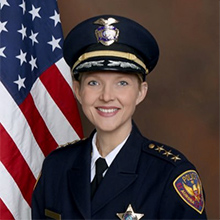
I made a mistake in affixing a complaint about a journalist to a singular incident. Because of this error, the message was lost in translation and was interpreted as an attack on journalists who file Freedom of Information Act (FOIA) requests.
The latter is not the case, and I believe that my transparency on behalf of my police department as well as my very public views on holding police officers accountable speak to this truth.
Perhaps that mindset is the catalyst for the frustration I feel with any reporter who, rather than reporting, files FOIA requests by the dozen. Some of the requests leave me scratching my head, and I wonder what story will arise out of the seemingly innocuous information being collected. These voluminous requests have left me to deduct that it’s a fishing expedition and the reporter is looking for something (anything) to discredit our agency and our officers. My department has enjoyed a longstanding relationship with our local newspaper, and I can honestly say that the reporters I’ve worked with are some of the most talented and competent I’ve had the pleasure of working with so the recent distrust is new to me.
The Freedom of Information Act is justly in place, and since its inception, my department has honored the inquiries into the actions of our officers. Both police officers and journalists subscribe to the “trust but verify” philosophy, so I’ve never felt opposition to the practice until we experienced a reporter who appears to spend more time filing FOIA requests than reporting.
My department lives in the light, and I have no issue facing the residents and stakeholders of my city and telling them that I made a mistake. I have terminated officers for making mistakes, and I stand firm in my decisions because those who tarnish our badge have no place among the honorable officers who get it right day after day.
Let me be succinct in stating that every officer involved shooting warrants FOIA requests. That’s why it was my mistake to assert any linkage to the obsessive FOIA requests as part of the shooting incident. I’m hanging my head.
Wesley Lowery from the Washington Post was the first to attack me on Twitter, so he’s my favorite reporter right now. He was correct in placing me in his crosshairs because I know he genuinely believes that I was venting about a reporter who was verifying information from a shooting. That couldn’t be further from the truth.
So my purpose of this post is to seek first to understand and then be understood. I have been a cop my entire adult life, and I don’t know what it’s like to walk around in a reporter’s shoes. The shoes I wear are shiny and match my uniform. My point is that I don’t know what I don’t know.
If reputable and respected journalists respond and tell me that it is perfectly normal to file FOIA requests for the sake of filing, then I will stand corrected. But if I were in the shoes of a reporter, I think I would spend time keeping my readers informed and I would be vehement in my quest for truth. But in doing so, I would not automatically assume everyone is lying or withholding unless they gave me a reason to believe that. If I were suspicious of coverup or corruption, I would be steadfast in my pursuit to uncover the truth. Again, every shooting incident should meet that level of inquiry but those serious incidents aside, is there room to build trust? Ironically, law enforcement officers and journalists overlap in the fact-finding part of the mission.
Some police actions and the organizations to which they belong have justified this level of scrutiny, so that is not lost on me. But do the transgressions of the few translate into the automatic lack of trust for all? I fear the answer to this question.
With that, I will respond to the inquiries from Mr. Lowery on Twitter (@WesleyLowery) in this venue because I simply cannot communicate meaningfully in 140 characters or less (i.e., I talk too much).
1) Given the current environment, do you think a chief’s public targeting of this specific reporter could result in threats/violence for him/her?
Dear gawd, I hope not. I didn’t provide a name or a publication and the truth is, I never even considered that. I have a philosophical disagreement with the process by which the reporter reports but I would never instigate or purposefully condone violence. I respect the reporter’s humanity and wish no harm.
2) While I think reporters can be strategic in what we request, shouldn’t use of deadly force always prompt our scrutiny/requests for info?
Yes. I do. If the actions of a police officer result in force, I believe we should be scrutinized to determine if those actions are lawful. If we are charged with upholding the law, we should follow the law.
3) I file many FOIAs; not all lead directly to articles. Does that mean I am no longer entitled to public information…?
Of course not. But just like you might say to a police officer, “Do you always have to go to force options?” The answer is no. But I do believe FOIA requests should be strategic and not just a fishing expedition. That is where the disconnect seems to be.
Maybe we just keep the dialogue going in an attempt to see each other up close. I’m a cop and that might make you deduct something about me before having met me. Reporters are being villainized for “fake news, ” and a faction of society is adopting that narrative. I’m not one of those people. The media is a crucial component of our society and keeping those in power accountable is important and honorable work.
Let us all keep fighting the good fight even in discourse.
This post was originally published on September 26, 2017 on Chief Ziman’s blog.